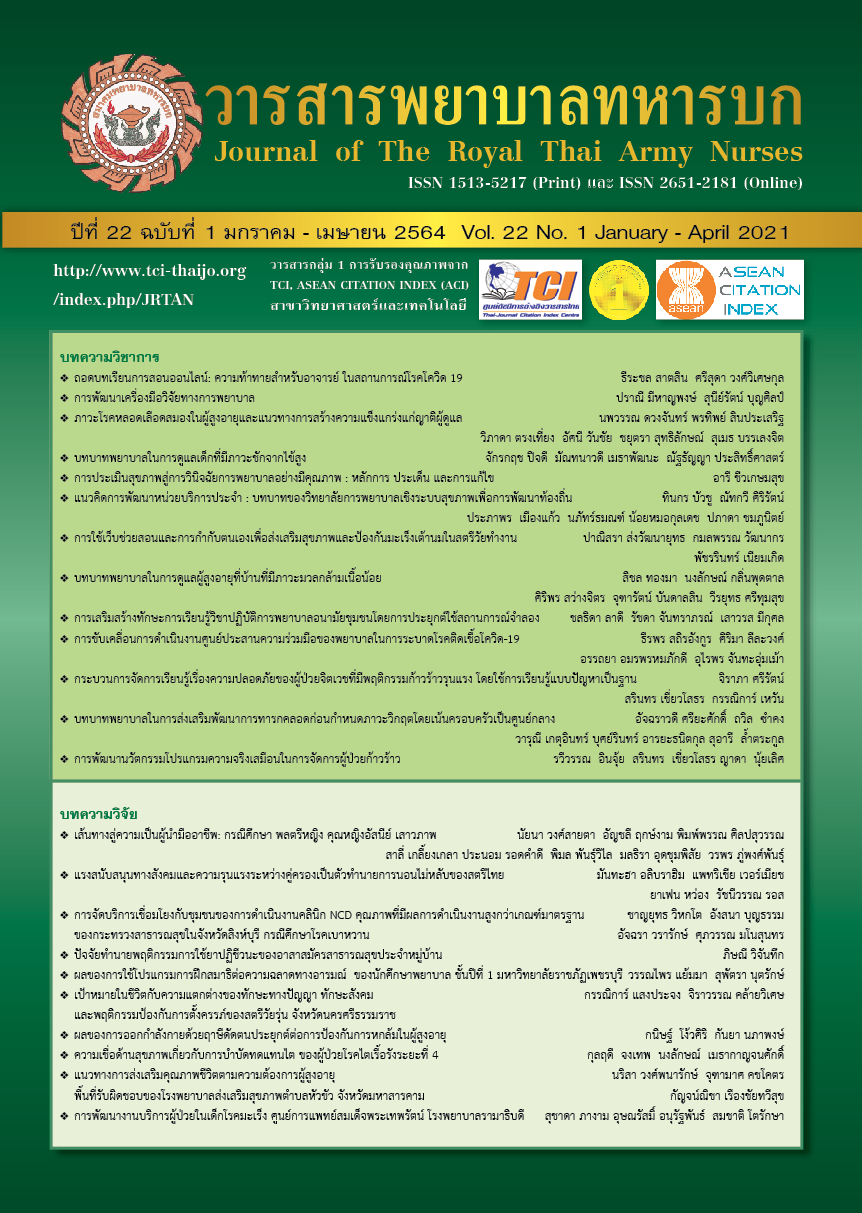Effects of Simulation-Based Learning on Perceived Self-Efficacy of Nursing Students in Caring for Patients with Septic Shock
Keywords:
Simulation base learning, Perceived self-efficacy, Nursing student, Caring, Patients with septic shockAbstract
This quasi-experimental research, one group pre-posttest design, aimed to test the effect of a simulation-based learning on increasing self-efficacy among the fourth year nursing students. Participants were 113, 4th year nursing students who were studying the Nursing Care of Persons with Problem III. Research instruments composed of 1) a simulation-based learning protocol of patient with septic shock 2) high-fidelity simulation model, and 3) perceived self - efficacy questionnaire. Data were analyzed using descriptive statistic such as percentage, mean and standard deviation and paired t-test.
The results showed that after the study completion, students had significant higher perceived self-efficacy score in caring for patients with septic shock than before study. Before the study a mean score of perceived self- efficacy score was 339.016 (SD = 5.67) and increased to 52.06 (SD = 4.73) after attending the simulation-based learning. This study approved that simulation-based learning method improved nursing’s student self-efficacy in caring for patients with septic shock. Also, this method can help students building their self confidence to caring patient with septic shock.
Downloads
References
Panich V. Way to create learning for students in the 21st century. Bangkok: Tatata Public Limited; 2012. (in Thai)
Punmalee P, Seekhao O. The results of teaching and learning using case studies on development The ability to use the nursing process in the clinic of nursing students. Journal of the Nursing Council. 2012; 24(3):81-93. (in Thai)
Bandura A. Self-efficacy: Toward a unifying theory of behavioral chang. Psychological Review. 1977; 84(2):191-215.
Bandura A. Self-efficacy: The exercise of control. New York : W.H. Freeman and Company; 1997.
Marie NB, Kathei A, David NB, and Jonathan BV. The use of human patient simulators best practices with novice nursing students. Nursing Education Research. 2006; 31(4):170-4.
Khaemani T. Knowledge science to organize effective learning processes. Bangkok. Publisher of Chulalongkorn University Printing; 2014. (in Thai)
Jeffries PR. A framework for designing implementing and evaluating simulations used as teaching strategies in nursing. Nursing Education Perspectives. 2005; 26(2):96-103.
Jamjang S, Yomdit V, Pongphetdit B, Pitaksin D, Changsieng P, Montong A. Effects of using simulation-based learning for preparation of nursing practicum on perceptions of self efficacy in performing nursing care in a hospital. Nursing Journal of the Ministry of Public Health. 2017; 27:46-58. (in Thai)
Khalalia R. Simulation in nursing education of student’ outcomes at their first clinical practice combined with simulations. Nurse Education Today.2014; 34:252-8.
Mohamed SA, Fashafsheh IH. The effect of simulation-based training on nursing students’ communication skill, self-efficacy and clinical competence for nursing practice. Open Journal of Nursing, 2019; 9:855-69.
Sinthuchai S, Ubolwan K. Fidelity simulation based learning: Implementation to learning and teaching management. Journal of The Royal Thai Army Nurses. 2017; 18(1):29-38. (in Thai)
Kumkong M, Leejareon P, Aramrom Y, Jitviboon A. Effects of simulation-based learning on percieved self-efficacy in providing nursing care for advanced life support to patients with critical Illness or emergency condition among nursing students.The Southen College Network Journal of Nursing and Public Health. 2016; 3(3): 52-64. (in Thai)
Srisathitnarakoon B. Research methodology in nursing science. 2 nd ed. Bangkok: Chulalongkorn UniversityPrinting; 2002. (in Thai)
Khamani T. Science of teaching knowledge for effective learning process management. 16th ed. Bangkok: Chulalongkorn University Printing; 2014. (in Thai)
Cato ML. Nursing student anxiety in simulation setting: A mixed methods study. [Dissertation and Theses]. Portland State University; 2013.
Downloads
Published
How to Cite
Issue
Section
License
บทความหรือข้อคิดเห็นใดใดที่ปรากฏในวารสารพยาบาลทหารบกเป็นวรรณกรรมของผู้เขียน ซึ่งบรรณาธิการหรือสมาคมพยาบาลทหารบก ไม่จำเป็นต้องเห็นด้วย
บทความที่ได้รับการตีพิมพ์เป็นลิขสิทธิ์ของวารสารพยาบาลทหารบก
The ideas and opinions expressed in the Journal of The Royal Thai Army Nurses are those of the authors and not necessarily those
of the editor or Royal Thai Army Nurses Association.






